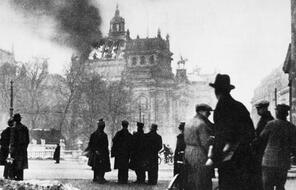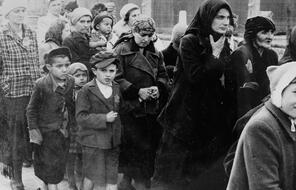Self-Determination
At a Glance
Language
English — USSubject
- History
- Human & Civil Rights
- The Holocaust
Wilson’s Fourteen Points were based on a major idea—the principle of self-determination, under which nationalities would have their own states. The members of a nationality or ethnic group share a cultural heritage, often associated with the place of its members’ birth or descent.
With the collapse of the Ottoman, Russian, Austro-Hungarian, and German Empires during and at the end of the war, the peacemakers at Versailles expected to draw new borders, creating new nations with racial or ethnic homogeneity. The Versailles delegates believed that this would substantially decrease, if not end, violence between different nationalities inhabiting the same country.
But as historian Margaret MacMillan explains, “The possibilities for dividing up peoples were unending, especially in central Europe, where history had left a rich mix of religions, languages and cultures. About half the people living there could be counted as members of one national minority or another. How were peoples to be allocated to one country or another when the dividing lines between one nation and another were so unclear?” 1
Articles 81, 82, and 84 show how the treaty attempted to address this question in the newly created state of Czecho-Slovakia.
ARTICLE 81.
Germany, in conformity with the action already taken by the Allied and Associated Powers, recognises the complete independence of the Czecho-Slovak State. . . . Germany hereby recognises the frontiers of this State as determined by the Principal Allied and Associated Powers and the other interested States.
ARTICLE 82.
The old frontier as it existed on August 3, 1914, between Austria-Hungary and the German Empire will constitute the frontier between Germany and the Czecho-Slovak State.
ARTICLE 84.
German nationals habitually resident in any of the territories recognised as forming part of the Czecho-Slovak State will obtain Czecho-Slovak nationality ipso facto and lose their German nationality. 2
A related question, addressed in Article 22 of the treaty, was whether the principle of self-determination should apply to the people of former German colonies and current Allied ones.
ARTICLE 22.
To those colonies and territories which as a consequence of the late war have ceased to be under the sovereignty of the States which formerly governed them and which are inhabited by peoples not yet able to stand by themselves under the strenuous conditions of the modern world, there should be applied the principle that the well-being and development of such peoples form a sacred trust of civilisation and that securities for the performance of this trust should be embodied in this Covenant. The best method of giving practical effect to this principle is that the tutelage of such peoples should be entrusted to advanced nations who by reason of their resources, their experience or their geographical position can best undertake this responsibility. . . . 3
Connection Questions
- How would you define the concept of self-determination in your own words? Why did Woodrow Wilson and others believe that using this principle to create new countries could prevent future wars?
- What does the example of the new state of Czecho-Slovakia suggest about the complications of using nationalities as the basis for creating new countries? What other difficulties might arise?
- What are some ways that life might change for ethnic minorities within a large empire after the area in which they are living becomes its own nation?
- What does Article 22 suggest about how pre-war imperialist ideas affected those who wrote the treaty?
- 1Margaret MacMillan, Paris 1919: Six Months that Changed the World (New York: Random House, 2003), 12.
- 2David Stevenson, Cataclysm: The First World War as Political Tragedy (New York: Basic Books, 2004), 422.
- 3“The Versailles Treaty, June 28, 1919,” available at the Avalon Project (Yale Law School), accessed March 2, 2016.
How to Cite This Reading
Facing History & Ourselves, "Self-Determination," last updated August 2, 2016.








